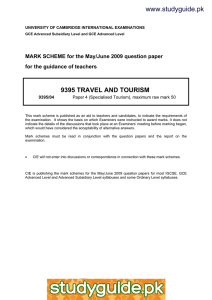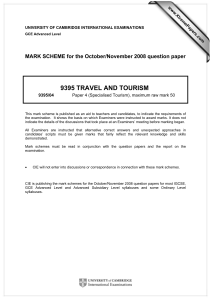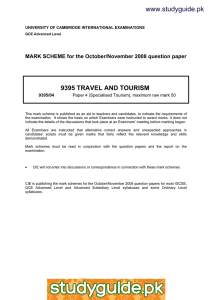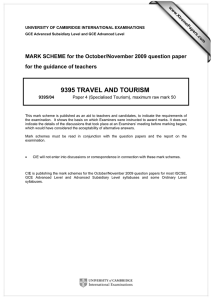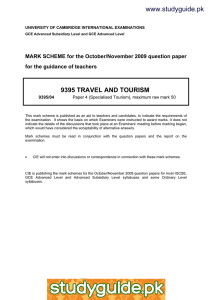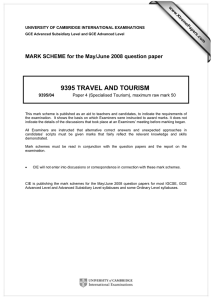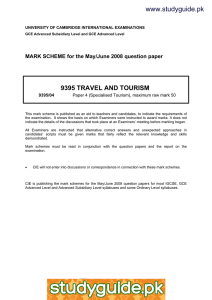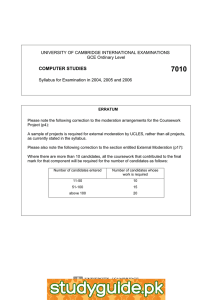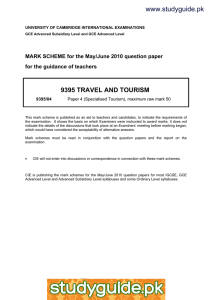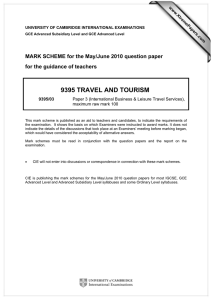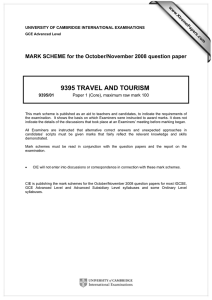9395 TRAVEL AND TOURISM for the guidance of teachers
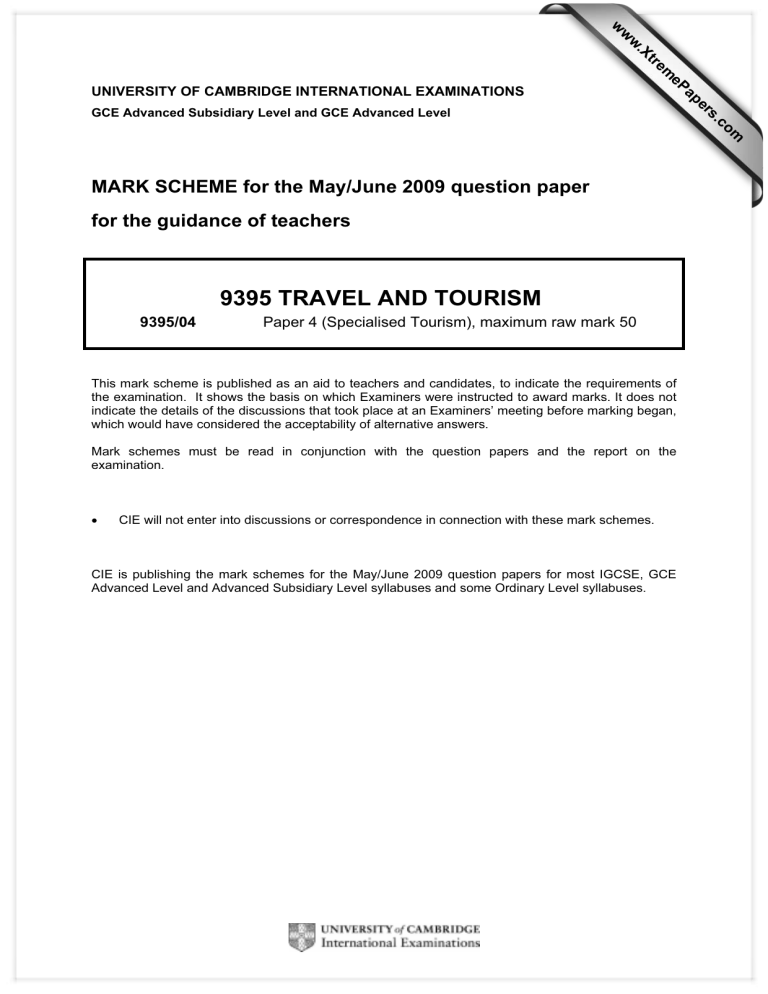
www.XtremePapers.com
UNIVERSITY OF CAMBRIDGE INTERNATIONAL EXAMINATIONS
GCE Advanced Subsidiary Level and GCE Advanced Level
MARK SCHEME for the May/June 2009 question paper for the guidance of teachers
9395/04
9395 TRAVEL AND TOURISM
Paper 4 (Specialised Tourism), maximum raw mark 50
This mark scheme is published as an aid to teachers and candidates, to indicate the requirements of the examination. It shows the basis on which Examiners were instructed to award marks. It does not indicate the details of the discussions that took place at an Examiners’ meeting before marking began, which would have considered the acceptability of alternative answers.
Mark schemes must be read in conjunction with the question papers and the report on the examination.
• CIE will not enter into discussions or correspondence in connection with these mark schemes.
CIE is publishing the mark schemes for the May/June 2009 question papers for most IGCSE, GCE
Advanced Level and Advanced Subsidiary Level syllabuses and some Ordinary Level syllabuses.
Page 2 Mark Scheme: Teachers’ version
GCE A/AS LEVEL – May/June 2009
Question Expected Answer
Syllabus
9395
Paper
04
1 (a) Define the term ‘eco-tourism’.
One mark for – any reference to damaging the environment - recreational activity in natural surroundings. Second mark if candidate adds social responsibility e.g., “eco or responsible travel is travel to natural areas that conserves the environment and improves the well-being of local people.”
(b) Explain ways in which Michelle and Andres have encouraged local tourism development projects.
One mark for identification and a further mark for explanation.
From:
• encouraging members to participate in industry (1) by opening hostels and restaurants in the area (1)
• providing interest-free loans (1) to a neighbour to help him start a horseback riding business
• organised a tourist transportation co-operative (1) with local vehicle owners (1)
• encourage locals to become guides (1) and take tourists hiking (1)
Mark Focus AO
2 4.1 AO1–2
4 4.1 AO2–2
AO3–2
(c) Assess the methods that could be used “to help bring traditional Andean folk music back into the area.”
Level of response 1, 2, 3
Level 1 (1–3) candidates identify methods
Level 2 (4–6) candidates explain/analyse methods
Level 3 (7–9) candidates assess methods
From:
•
ads
• spreading crafts and techniques – i.e., educational value
• use of a lending library to allows many to use instruments and allows tourist to appreciate traditions and importance to culture of that area
• good for both tourists and community alike
• festivals
• events
• exhibitions
• music Holiday themes or similar
9 4.2 AO2–3
AO3–3
AO4–3
© UCLES 2009
Page 3
(d)
Mark Scheme: Teachers’ version
GCE A/AS LEVEL – May/June 2009
Syllabus
Discuss how ecologically friendly organisations, such as the Black Sheep Inn, can have a positive environmental impact at both a local and national level. You should refer to examples with which you are familiar.
Levels of response 1, 2, 3
Level 1 (1–3) candidates identify positive environmental impacts at either local or national level
Level 2 (4–6) candidates explain/analyse positive environmental impacts at local and/or national level
Level 3 (7–10) candidates discuss positive impacts at both local and national level; top level must be judgemental statement
From:
• helps with management of historical sites
• biodiversity of endangered species
• energy
• water supplies and waste disposal
• educational benefit at a regional and local level that can affect national influence or similar
9395
Paper
04
10 4.1 AO1–3
AO3–3
AO4–4
2 (a)
(b)
Zorbing is an example of a land-based adventure tourism
“thrill pursuit”. Give three
other examples of such ‘thrill pursuits’.
One mark for one suggestion from:
•
kayaking
• white water rafting
• snorkelling
• diving or similar
Zorbing takes place over large areas of countryside.
Explain three policies that could be implemented to help prevent negative environmental impacts of zorbing.
One mark for each identification with a further mark for explanation.
From:
• education
• zoning – dedicated areas
• land created specifically for pursuit
•
work on habitat preservation
•
regeneration and conservation
• capacity
• pricing
• principles of sustainability or similar
3 4.3 AO2
3×2 4.2 AO1–3
4.3 AO3–3
© UCLES 2009
Page 4 Mark Scheme: Teachers’ version
GCE A/AS LEVEL – May/June 2009
(c) Explain ways in which the rapid growth in adventure tourism may create negative socio-cultural impacts.
One mark for up to three ways with a further two marks for exemplification per way. loss of privacy (1) visitor congestion (1) demonstration effect (1) creates unhappiness within host country (1) that leads to a lack of cultural appreciation (1) or similar
Syllabus
9395
Paper
04
3×2 4.3 AO2–3
AO3–3
(d) With to adventure tourism activity you have studied, discuss its economic impacts on the local community.
Answers can be positive or negative impacts.
Levels of response 1, 2, 3
Level 1 (1–3) candidates identify economic impacts of one adventure tourism activity
Level 2 (4–6) candidates explain the economic impacts of one adventure tourism activity
Level 3 (7–10) candidates discuss the economic impacts of one adventure tourism activity
From:
• income
• job
• economic development for the area and community as a whole
• development of infrastructure
• over dependency of the adventure tourism
• leakage wealth
• brought in labour/expertise or similar
10 4.1 AO2–3
4.2
4.3
AO3–3
AO4–4
© UCLES 2009
